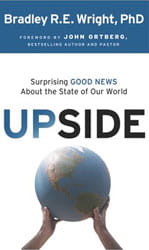 Before L.L. Bean, Bass Pro Shops, and other outdoor superstores, George Herter supplied Americans with all the gear they would need for anything and everything. Beginning in 1937, the cranky eccentric mailed out his catalogs and getting one was described as "Christmas with bullets." Herter mixed opinion with gross misinformation resulting in copy reading like a book report gone mad. One of his gems was, "Being eaten alive by hyenas is less painful than you would think."
Before L.L. Bean, Bass Pro Shops, and other outdoor superstores, George Herter supplied Americans with all the gear they would need for anything and everything. Beginning in 1937, the cranky eccentric mailed out his catalogs and getting one was described as "Christmas with bullets." Herter mixed opinion with gross misinformation resulting in copy reading like a book report gone mad. One of his gems was, "Being eaten alive by hyenas is less painful than you would think."
Bradley Wright, author of the new book Upside: Surprising Good News About the State of Our World, has not been gnawed on by hyenas (I hope), but he tries to reassure us that some things we think must really be bad actually stand in pretty good shape.
In Upside, Wright stands against the doomsday sayers, end of the world predictors, conspiracy ranters, partisan politicians, talk radio hosts, and generally cranky complainers and grousers to say that the world, though far from flawless, may be improving in a lot of ways. A sociology professor at the University of Connecticut, he comes chock-full of stats, polls, surveys, and data to make his point. Sociologists love this stuff. He pulls off the two-fold trick of making these things comprehensible to people who don't love or trust stats. And he does it enjoyably. Brad's droll sense of humor punches through regularly. How many sociology books do we chuckle through?
What drives the information we get about our world? Wright might have a future book from this chapter alone. He walks us through the labyrinth of things like statistic overload, the media, advocacy groups, flawed anecdotes, short-term fluctuations, yearning for nostalgia, and unrealistic expectations of the American Dream. He doesn't leave out Christians who hear things through "Last Days" filters (aka Harold Camping) and consequently embarrass their faith. If we want to, we can find someone to make things sound as bad as we want them to be. But Wright helps us cultivate a discerning ear that recognizes when we're encountering information either false or bent in a direction suiting someone else's agenda.
The book surprises with treats. I've already mentioned the author's sense of humor. He writes alongside the readers giving them a little punch on the shoulder as if to say, "If you like that, wait until you've read this." The book bristles with stories of interesting people who challenge the status quo like Bjorn Lomborg, a Danish university statistics guy and member of Greenpeace. An article in Wired magazine by Julien Simon challenged his thoughts on the environment and he set out to prove the article wrong. What he discovered overturned almost all his Greenpeace convictions and led him to write a book, The Skeptical Environmentalist, often vilified by environmentalists but not refuted.
Upside is also peppered with little pop-up boxes that will send many running to Google for more information. If the world is better than I've been inclined to think, how can I be part of that? How do I get to play? The boxes talk about Christian individuals and groups making a concrete difference right now. Jesus Christ never intended his followers to lump themselves in with the consumers of culture for whom the fixation on comfort and security comprise their whole bucket list. The reference boxes Brad sprinkles throughout the book provide some attractive snapshots of places and ways to continue the good things happening. If not for ourselves, we will run across one or two that say, "I know somebody that needs to see this."
Read more from the Upside Book Club at Patheos here.
The chapters cover a broad range of topics including finances and the economy, education, health, marriage and family, crime and the ever-present concern with personal happiness. Be prepared to argue with Brad. At least three groups of people will get some of their chains rattled. Some people just foam up against everything. It doesn't matter whether the glass looks half empty or half full; the glass is just filthy, period. Some of us believe what we believe regardless of facts or evidence. Belief (be it religious, atheistic, philosophical, political, etc.) is very powerful. Beliefs can and do run very deeply with sometimes little relationship to reasons for those beliefs. Even the emergence of evidence to the contrary often will not change them. (Thousands still believe that Area 51 in Nevada marks where the government has been hiding UFO evidence for decades instead of a Cold War weapons development site. I personally believe it's where aging TV and movie personalities go for training on making long infomercials that clog the airwaves on Sunday afternoons. We both know we're right and don't think of trying to talk us out of it.)




